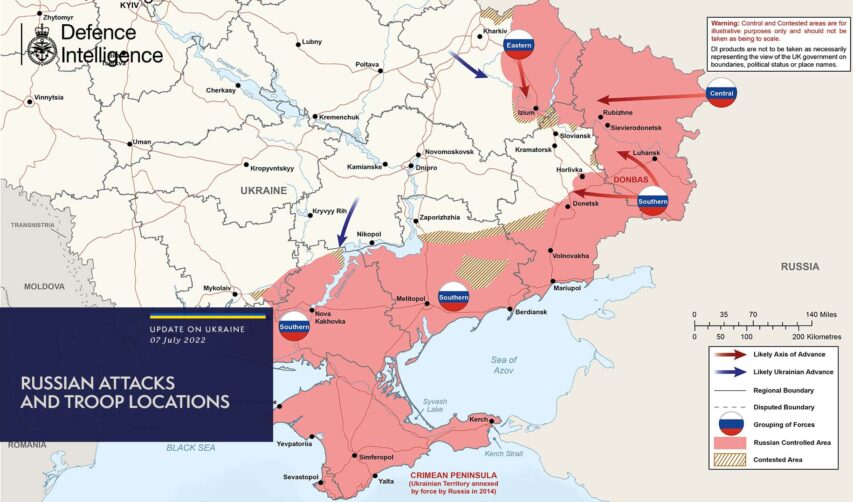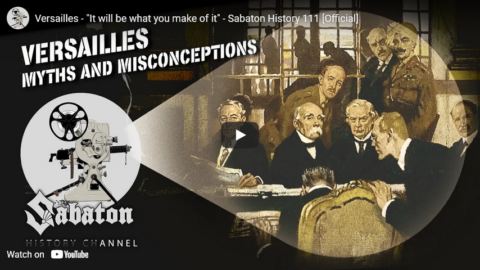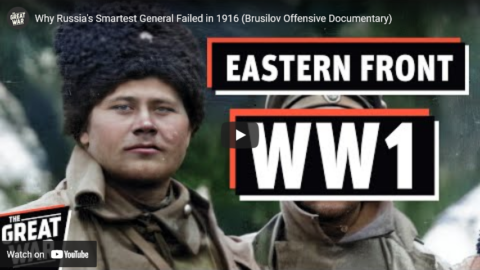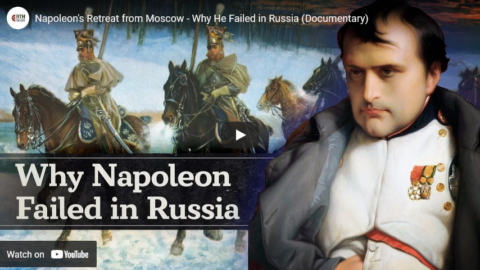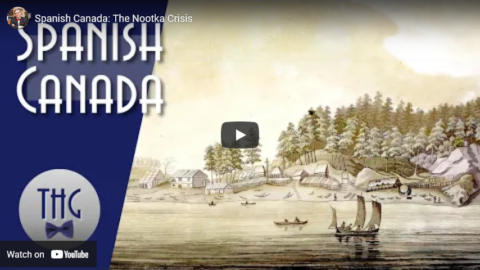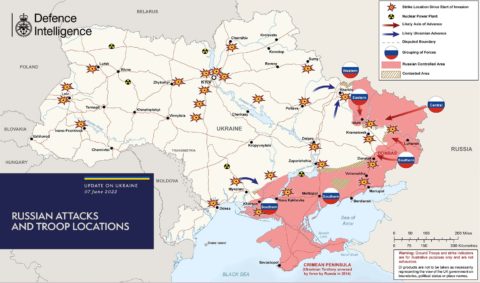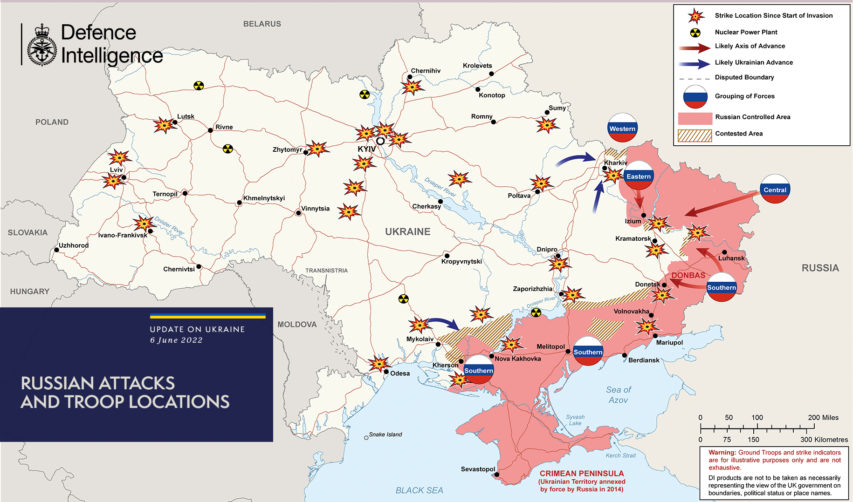World War Two
Published 9 Jul 2022Over the last few weeks entire cities-worth of troops along with all the logistical support needed to support them have gathered in and around the Kursk salient. Here’s how they’ve been deployed, and where they could go from here.
(more…)
July 11, 2022
Troop Deployments for the Battle of Kursk – WW2 Special
July 8, 2022
The Russian way of war
In First Things, George Weigel identifies what we’ve learned about the Russian “way of war” from the ongoing conflict with Ukraine:
Four and a half months after Russia invaded Ukraine on the Orwellian pretext of displacing a “Nazi” regime — a regime that enjoys a democratic legitimacy absent from Russia for two decades — what have we learned about, and from, the Russian way of war?
We have learned that the Russian way of war is inept strategically, tactically, and logistically: an army using inferior equipment, bereft of competent non-commissioned officers, and replete with ill-trained draftees; an army that relies on brute force to bludgeon its way toward its objectives. We have learned that the Russian way of war willfully obliterates cities and deliberately destroys economic infrastructure. We have learned that the Russian way of war targets hospitals and schools, cultural and educational institutions, churches, synagogues, and mosques in an attempt to eradicate a culture and a nation that Russian president Vladimir Putin insists has no right to exist, save as a Russian vassal. Thus the twenty-first-century Russian way of war breathes the spirit of eighteenth-century imperialism, with President Putin comparing himself to that quintessential Russian imperialist, Peter the Great, and telling schoolchildren asked to name Russia’s borders in a geography bee that “the borders of Russia never end”.
We have learned that the Russian way of war is insensible to casualty rates, its own army’s and Ukraine’s. We have learned that the Russian way of war includes abandoning the Russian dead or disposing of their remains in mobile cremation units, so that body bags don’t flood the home front and raise questions about the wisdom of Putin and his generals. We have learned that the Russian way of war includes the humiliation, torture, and probable execution of prisoners of war. We have learned that the Geneva Conventions on the humane treatment of POWs mean no more to the Russian military and its political masters than does the Fifth Commandment.
We have learned that the Russian way of war includes the use of cluster munitions and unguided missiles specifically forbidden by international law. Thus the Russian way of war systematically violates the two in bello (war-fighting) principles of the just war tradition: proportionality of means (no more force than necessary to achieve a legitimate military objective) and discrimination (non-combatant immunity). We have learned that the Russian way of war features widespread rape, gross theft, and the summary execution of civilians, as well as kidnapping civilians in Russian-occupied territories, relocating them, and attempting to coerce them into renouncing their Ukrainian allegiance.
We have learned that the Russian way of war includes illegal blockades of Ukrainian ports to prevent grain shipments, thus threatening starvation in Third World countries. We have learned that the Russian way of war includes energy blackmail, threats of nuclear-weapons use, and blatant bullying of other countries, including Lithuania and Kazakhstan.
July 3, 2022
Tougher than Guadalcanal: New Georgia – 201 – July 2, 1943
World War Two
Published 2 Jul 2022The Allies begin the next phase of their Solomon Islands offensives, the invasion of New Georgia, even as the regional fighting continues on New Guinea. Adolf Hitler schedules his summer Kursk offensive for July 5th, and the Allied invasion of Sicily is set for July 10th.
(more…)
July 2, 2022
Versailles – “It will be what you make of it” – Sabaton History 111 [Official]
Sabaton History
Published 1 Jul 2022There are a great many myths and misconceptions about the Treaty of Versailles, and it has been used and even weaponized many times over the years. Today, Indy goes over the nuts and bolts of what it actually was and what it actually did.
Support Sabaton History on Patreon: https://www.patreon.com/sabatonhistory
Listen to “Versailles” on the album The War To End All Wars: https://music.sabaton.net/TheWarToEnd…
Listen to Sabaton on Spotify: http://smarturl.it/SabatonSpotify
Official Sabaton Merchandise Shop: http://bit.ly/SabatonOfficialShopHosted by: Indy Neidell
Written by: Markus Linke and Indy Neidell
Directed by: Rickard Erixon and Indy Neidell
Produced by: Pär Sundström, Astrid Deinhard and Spartacus Olsson
Creative Producer: Rickard Erixon, Indy Neidell
Set Design: Daniel Eriksson, Rickard Erixon,
Executive Producers: Pär Sundström, Joakim Brodén, Tomas Sunmo, Indy Neidell, Astrid Deinhard, and Spartacus Olsson
Post-Production Director: Marek Kamiński
Editor: Iryna Dulka
Sound Editor: Marek Kamiński
Archive: Reuters/Screenocean – https://www.screenocean.com
Colorizations by: Olga Shirnina, a.k.a. Klimbim – https://klimbim2014.wordpress.com/Sources:
IWM: 130-09+10, IWM 130-01
Auckland Libraries Heritage Collections 5-1276
Médiathèque de l’architecture et du patrimoine
hpebley3 from freesond.org
All music by: SabatonAn OnLion Entertainment GmbH and Stuffed Beaver LTD co-Production.
© Stuffed Beaver LTD, 2019 – all rights reserved.
June 26, 2022
Two Hundred Weeks of War – WW2 – 200 – June 25, 1943
World War Two
Published 25 Jun 2022The Allies make some preliminary moves ahead of their next big operation in the Solomon Island as well as a few before their impending invasion of Sicily. Meanwhile, in the Soviet Union, Soviet citizens are laying over a million mines in anticipation of the impending German attack at Kursk.
(more…)
June 25, 2022
Why Russia’s Smartest General Failed in 1916 (the Brusilov Offensive)
The Great War
Published 24 Jun 2022Sign up for Curiosity Stream and get Nebula bundled in and SAVE 26%:
https://curiositystream.com/thegreatwarThe start of the Brusilov Offensive was the most successful Russian military operation during the First World War. It crippled the Austro-Hungarian Army and forced the Germans to divert troops from Verdun. But the Brusilov Offensive ultimately was a failure and cost the Russians an enormous number of men. What went wrong?
» SUPPORT THE CHANNEL
Patreon: https://www.patreon.com/realtimehistory» THANKS TO OUR CO-PRODUCERS
John Ozment, James Darcangelo, Jacob Carter Landt, Thomas Brendan, Kurt Gillies, Scott Deederly, John Belland, Adam Smith, Taylor Allen, Rustem Sharipov, Christoph Wolf, Simen Røste, Marcus Bondura, Ramon Rijkhoek, Theodore Patrick Shannon, Philip Schoffman, Avi Woolf, Emile Bouffard, William Kincade, Daniel L Garza, Stefan Weiß, Matt Barnes, Chris Daley, Marco Kuhnert, Simdoom» SOURCES
Buttar, Prit, Russia’s Last Gasp: The Eastern Front 1916-1917, (Oxford: Osprey Publishing, 2016)Dowling, Timothy C., The Brusilov Offensive, (Indianapolis: Indiana University Press, 2008)
Golovin, Nicholas, “Brusilov’s Offensive: The Galician Battle of 1916”, The Slavonic and East European Review, Volume 13, Number 39, (1935)
Schindler, John, “Steamrollered in Galicia: The Austro-Hungarian Army and the Brusilov Offensive, 1916”, War in History, Volume 10, Number 1, (2003)
Stone, David R., The Russian Army in the Great War: The Eastern Front, 1914-1917, (Lawrence, KS: University Press of Kansas, 2015)
Tunstall, Graydon A., “Austria-Hungary and the Brusilov Offensive of 1916”, The Historian, Volume 70, Issue 1, (2008)
Uzefovich, Alexis M., “Russia in the World War, 1914-1918”, The Military Engineer, Volume 33, Number 190, (1941)
» OUR SISTER CHANNEL
https://youtube.com/realtimehistory»CREDITS
Presented by: Jesse Alexander
Written by: Jesse Alexander
Director: Toni Steller & Florian Wittig
Director of Photography: Toni Steller
Sound: Toni Steller
Editing: Toni Steller
Motion Design: Toni Steller
Mixing, Mastering & Sound Design: http://above-zero.com
Research by: Jesse Alexander
Fact checking: Florian WittigChannel Design: Yves Thimian
Contains licensed material by getty images
Maps: MapTiler/OpenStreetMap Contributors & GEOlayers3
All rights reserved – Real Time History GmbH 2022
June 19, 2022
Kursk: Soviets Dig-In for Blitzkrieg – WW2 – 199 – June 18, 1943
World War Two
Published 18 Jun 2022The Soviets have put civilians to work by the hundreds of thousands, building line after line of defenses in the Kursk salient, where they are sure the Germans are soon to attack. Meanwhile the Allies are making moves in preparations for two big upcoming offensives of their own — in Sicily and the Central Solomon Islands.
(more…)
June 17, 2022
Napoleon’s Retreat from Moscow – Why He Failed in Russia
Real Time History
Published 16 Jun 2022Sign up for the CuriosityStream + Nebula Bundle: https://curiositystream.com/realtimeh…
Napoleon’s retreat from Moscow and from Russia as a whole is one of the most dramatic scenes in history. Starving and freezing, the French Grande Armée is desperately trying to reach the Berezina River. The revitalized Russian Army is on their heels and almost catches their prey in the 2nd Battle of Krasny. But it wasn’t just “General Winter” that defeated Napoleon in Russia.
» SUPPORT US ON PATREON
https://patreon.com/realtimehistory» THANK YOU TO OUR CO-PRODUCERS
John Ozment, James Darcangelo, Jacob Carter Landt, Thomas Brendan, Kurt Gillies, Scott Deederly, John Belland, Adam Smith, Taylor Allen, Rustem Sharipov, Christoph Wolf, Simen Røste, Marcus Bondura, Ramon Rijkhoek, Theodore Patrick Shannon, Philip Schoffman, Avi Woolf, Emile Bouffard, William Kincade, Daniel L Garza, Stefan Weiß, Matt Barnes, Chris Daley, Marco Kuhnert, Simdoom» SOURCES
Boudon, Jacques-Olivier. Napoléon et la campagne de Russie en 1812 (2021).
Chandler, David. The Campaigns of Napoleon, Volume 1 (New York 1966).
Lieven, Dominic. Russia Against Napoleon (2010).
Mikaberidze A. The Battle of the Berezina: Napoleon’s Great Escape (Pen&Sword Military, 2010)
Rey, Marie-Pierre. L’effroyable tragédie: une nouvelle histoire de la campagne de Russie. (2012).
Zamoyski, Adam. 1812: Napoleon’s Fatal March on Moscow. (2005).
Отечественная война 1812 года. Энциклопедия (Москва: РОССПЭН, 2004)
Безотосный В. М. Россия в наполеоновских войнах 1805–1815 гг. (Москва: Политическая энциклопедия, 2014)
Троицкий Н.А. 1812. Великий год России (Москва: Омега, 2007)
(Прибавление к «Санкт-Петербургским ведомостям» №87 от 29 октября 1812 / http://www.museum.ru/museum/1812/War/…)» OUR STORE
Website: https://realtimehistory.net»CREDITS
Presented by: Jesse Alexander
Written by: Jesse Alexander
Director: Toni Steller & Florian Wittig
Director of Photography: Toni Steller
Sound: Above Zero
Editing: Toni Steller
Motion Design: Toni Steller
Mixing, Mastering & Sound Design: http://above-zero.com
Digital Maps: Canadian Research and Mapping Association (CRMA)
Research by: Jesse Alexander, Sofia Shirogorova
Fact checking: Florian WittigChannel Design: Simon Buckmaster
Contains licensed material by getty images
Maps: MapTiler/OpenStreetMap Contributors & GEOlayers3
All rights reserved – Real Time History GmbH 2022
June 15, 2022
Istanbul: City of Spies – WW2 – Spies & Ties 18
World War Two
Published 14 Jun 2022Neutral Turkey appears to be an island of peace in a sea of war. But if you look a little closer though and there’s another story. Assassins ply their deadly trade. Spies slip in and out of occupied Europe. The Allies and Axis battle for influence. The secret war is in full swing.
(more…)
June 12, 2022
Eisenhower Lays Out His Plans for Sicily – WW2 – 198 – June 11, 1943
World War Two
Published 11 Jun 2022The Allies bomb Mediterranean islands in preparation for their invasion of Sicily next month; they also prepare a lot of deceptions to mislead the enemy as to where they will attack. The German plans for the summer offensive against the Kursk salient are ever more concrete, and in the field this week, the Chinese stop the Japanese offensive cold.
(more…)
June 11, 2022
Spanish Canada: The Nootka Crisis
The History Guy: History Deserves to Be Remembered
Published 10 Jun 2022In 1789, the Spanish empire prepared to enforce their territorial claims far to the North of what they nominally controlled, and instigated a crisis that threatened to bring the great European powers to war.
Check out our new community for fans and supporters! https://thehistoryguyguild.locals.com/
This is original content based on research by The History Guy. Images in the Public Domain are carefully selected and provide illustration. As very few images of the actual event are available in the Public Domain, images of similar objects and events are used for illustration.
You can purchase the bow tie worn in this episode at The Tie Bar:
https://www.thetiebar.com/?utm_campai…All events are portrayed in historical context and for educational purposes. No images or content are primarily intended to shock and disgust. Those who do not learn from history are doomed to repeat it. Non censuram.
Find The History Guy at:
New community: https://thehistoryguyguild.locals.com/
Please send suggestions for future episodes: Suggestions@TheHistoryGuy.netThe History Guy: History Deserves to Be Remembered is the place to find short snippets of forgotten history from five to fifteen minutes long. If you like history too, this is the channel for you.
Awesome The History Guy merchandise is available at:
teespring.com/stores/the-history-guyScript by JCG
#history #thehistoryguy #Canada
June 8, 2022
The Climate Wars are dead, merely collateral damage from the Russia-Ukraine War
JoNova links to this Foreign Policy article by Ted Nordhous, signfiying the end of a “lame Cold War substitute” as the conflict in Ukraine pushes it decisively off the agenda for most western nations:
Four days after Russian tanks rolled into Ukraine, the U.N. Intergovernmental Panel on Climate Change released its latest assessment of the impacts of global warming. Leading media outlets did their best to pick out the most dire scenarios and findings from the report. But the outbreak of the first major European war since 1945 kept the report off the front page or, at the very least, below the fold. “Climate Change Is Harming the Planet Faster Than We Can Adapt” simply couldn’t compete with “Putin Is Brandishing the Nuclear Option”.
Meanwhile, the headlong rush across Western Europe to replace Russian oil, gas, and coal with alternative sources of these fuels has made a mockery of the net-zero emissions pledges made by the major European economies just three months before the invasion at the U.N. climate summit in Glasgow, Scotland. Instead, questions of energy security have returned with a vengeance as countries already struggling with energy shortages and price spikes now face a fossil fuel superpower gone rogue in Eastern Europe.
In the decades following the end of the Cold War, global stability and easy access to energy led many of us to forget the degree to which abundant energy is existential for modern societies. Growing concern about climate change and the push for renewable fuels also led many to underestimate just how dependent societies still are on fossil fuels. But access to oil, gas, and coal still determines the fate of nations. Two decades of worrying about carbon-fueled catastrophes — and trillions of dollars spent globally on transitioning to renewable power — haven’t changed that basic existential fact.
Virtually overnight, the war in Ukraine has brought the post-Cold War era to a close, not just by ending Europe’s long era of peace, but by bringing basic questions of energy access back to the fore. A new era, marked by geopolitically driven energy insecurity and resource competition, is moving climate concerns down on the list of priorities. If there is a silver lining in any of this, it’s that a shift of focus back to energy security imperatives might not be the worst thing for the climate. Given the scant effect international climate efforts have had on emissions over the past three decades, a turn back toward energy realpolitik — and away from the utopian schemes that have come to define climate advocacy and policymaking worldwide — could actually accelerate the shift to a lower-carbon global economy in the coming decades.
The issue of climate change burst into the global debate just as the Cold War was coming to an end. As one existential threat seemingly receded, another came into view. For much of the international community, particularly the United Nations and its agencies, climate change also became much more than an environmental issue, offering an opportunity to reshape the post-Cold War order to be more equitable, multilateral, and politically integrated.
Nonetheless, when the framework for climate action emerged in the early 1990s, it built on the experience of the Cold War era. U.S.-Soviet arms control agreements became the model for global cooperation on climate change. Just as the superpowers had signed treaties to gradually draw down their nuclear weapons stocks, nations would commit to draw down their emissions. Yet the first major agreement to propose legally binding limits on emissions — the 1997 Kyoto Protocol — was dead from the moment the U.S. Senate unanimously rejected its terms, even before the negotiations had been finalized. Combine U.S. opposition with the understandable reluctance of energy-hungry, fast-developing nations such as China and India to even consider limiting emissions, and the inefficacy of international climate action was set.
June 7, 2022
100 days of fighting in Ukraine
In The Line, Andrew Potter rounds up the latest open source data on the Russo-Ukrainian war of 2022, and notes that the briefly enthusiastic western nations — having all posted Ukraine flags on their social media accounts and boycotted Russian vodka — are now noticeably suffering from battle (cheerleading) fatigue and are all rather obviously hoping Ukraine will sue for peace with the Russian aggressor:
We are now just past the one hundred day mark of Vladimir Putin’s insane invasion of Ukraine. But even as the Ukrainian forces are fighting ferociously for Severodonetsk, with president Volodymyr Zelensky making an amazing visit to troops right on the edge of the front lines of the eastern salient, a few Western leaders marked the occasion by suggesting that it’s getting on time for them to think about giving up.
According to Zelensky, Russian forces currently control around one fifth of Ukrainian territory, mostly in the east and the south. As he pointed out last Thursday in an address to the Luxembourg parliament, this is an area that is much larger than the entire Benelux region.
For Russia, this has come at a considerable cost. Reliable open source intelligence estimates put Russian losses at over 31,000 soldiers killed, 3,300 armoured vehicles and another 2,500 trucks destroyed, 200 lost aircraft, 175 helicopters, and 13 ships or boats. All of this for a “special operation” that was supposed to take no more than a long weekend including the victory parade, with the invaders welcomed as liberators.
Dear as this has been for Russia, for Ukrainians the price has been much, much higher. Reliable estimates of Ukrainian military losses are hard to come by, but something around half of the Russian figures is probably in the ballpark, though they could easily be much higher. Zelensky has not been totally shy in talking about losses; the other day he said the Ukrainian forces were losing 60-100 fighters a day, with another 500+ wounded, in fighting in the east.
These are staggering losses (recall that Canada lost 158 soldiers over the course of more than a decade in Afghanistan), but they don’t even begin to compare with what has happened to Ukraine’s civilians and to its cities. This war has been going on for so long, reports of Russian outrages and war crimes now so numerous, that history-making acts of outright barbarism have come and gone from the news pages in a matter of days: Bucha, Kramatorsk, Mariupol … the list goes on and grows. When all this is done, how many dead, deported and disappeared Ukrainians will there be? If it is 50,000 dead in Mariupol alone, a million or more is not out of the question.
For a few days and even weeks, the narrative was that Putin had gravely miscalculated. He clearly expected the Ukrainians to roll over and for the neighbours to just shrug and look the other way. Instead, the Ukrainians fought back and NATO and the West were galvanized into support and action. If Putin was worried about Ukraine bringing NATO and the EU to his doorstep, well, his worst nightmare had come true, with Sweden and Finland applying for expedited admission to the alliance.
But as degraded his army, as inept his generals, as degenerate his kleptocracy might be, Putin has always had a couple of aces up his sleeve: The abiding and reliable perfidy of the Germans and the French, and the increasing inability of the American-led anglosphere to maintain its focus. As Putin sees it, as this war stretches on the Americans and the Brits will lose interest, and the burning desire of Emmanuel Macron and Olaf Scholz to help Putin “save face” — i.e. give Russia some Ukrainian territory — will grow increasingly appealing.
June 5, 2022
Banzai Charges in Alaska – WW2 – 197 – June 4, 1943
World War Two
Published 4 Jun 2022The Chinese defeat the Japanese at Shipai Fortress and the Americans maul the Japanese in the Aleutians. The Japanese are also worried about the possibility of the USSR joining the war against them. Meanwhile the Allies still plan to invade Sicily, but have no idea what they’ll do after that.
(more…)
June 3, 2022
QotD: Snobbery and spying
During the Cold War, it was accepted that we would recruit spies and so would they.
Oxford and Cambridge became notorious hunting grounds for the Soviet Union, as they sought out clever young lefties who they might convince to go full retard into communism and then spy for the Motherland.
They had some success with some dapper young gentlemen called Philby, Maclean, Burgess, Blunt and Cairncross – that’s a story for another day.
It was notable that during the whole affair, British intelligence simply refused to believe that one of their own had been corrupted. They could not entertain such a notion, and so the Cambridge Five remained able to betray their country over and over again.
Alex Noble, “Hero Of The European Union”, Continental Telegraph, 2019-04-15.

